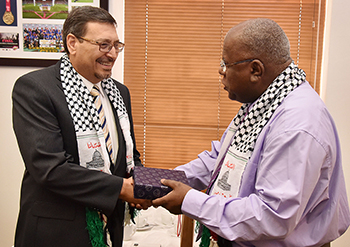Latest News Archive
Please select Category, Year, and then Month to display items
29 August 2024
|
Story Anthony Mthembu
|
Photo Harmse Photography
 Ross van Reenen, CEO of the Toyota Free State Cheetahs.
Ross van Reenen, CEO of the Toyota Free State Cheetahs.
The Business School at the University of the Free State (UFS) recently hosted the CEO of the Toyota Free State Cheetahs, Ross van Reenen, for a guest lecture. Van Reenen presented the guest lecture in the Business School Auditorium on the UFS Bloemfontein Campus on 21 August 2024.
Reflecting on Van Reenen’s address
In a lecture addressed to an auditorium filled with UFS staff and students, Van Reenen’s talk was divided into several sections. Firstly, he spoke about the concept of the ‘black swan’ in reference to the book written by Nassim Nicholas Taleb, titled The Black Swan: The Impact of the Highly Improbable. Referring to Taleb’s book, Van Reenen defined a ‘black swan’ as a rare event that has a severe impact, and the occurrence of which people try to explain. He used some examples to explore this concept as well as its implications, including COVID-19 and its impact on the world, and the tragic death of the people in the Titanic disaster. However, he delved deeper into 9/11 and the extent of its impact, saying that “9/11 was a major wake-up call in the world economy”. Van Reenen highlighted how some companies such as Barclays, for which he previously consulted, had to work to be up and running after the collapse of the Twin Towers in 9/11.
In addition, Van Reenen’s lecture also touched on the importance of the first ninety days of a job after an individual has been employed. “Those first ninety days are crucial, as you have to establish yourself in a company where you are paid less than you are worth,” Van Reenen said. As such, he gave the audience insight into what they could focus on in that time frame. This includes focusing on the small wins, as well as ensuring that you are working at keeping the team together, as the team is an integral part of an organisation.
Van Reenen concluded his address by speaking about his time as the CEO of the Toyota Free State Cheetahs, including some of the decisions he took to ensure the success of the organisation.
Palestinian delegation visit marks new bilateral relations
2015-11-27

Prof Jonathan Jansen and His Excellency Mr Hashem Dajani
Photo: Charl Devenish
|
The Office of International Affairs hosted the official visit of the Ambassador of Palestine, His Excellency Mr Hashem Dajani, to the University of the Free State (UFS) on 16-17 November 2015. Prof Jonathan Jansen, Vice-Chancellor and Rector of the UFS, welcomed the Ambassador and the Palestinian delegation to the Bloemfontein Campus. During the visit, they met with senior management of the university, including Dr Karen Lazenby (Registrar: Systems and Administration), Beata Mtyingizana (Director of International Affairs) and JC Van der Merwe (Deputy Director at the Institute of Reconciliation and Social Justice).
The visit marked the finalisation of a scholarship initiative which offers placement of Palestinian students to study at the UFS. The new Vice-Chancellor’s International Scholarship programme will recognise academic excellence and merit in undergraduate, postgraduate, as well as doctoral academic disciplines.
One of the strategic objectives of the UFS is that of internationalisation, which is strengthened by the scholarship programme. With the focus on Palestine, the university’s international footprint in non-traditional regions of the world, such as the Middle East, will therefore be highlighted.
To conclude the visit, the Institute for Reconciliation and Social Justice hosted a film screening featuring ‘Jerusalem, the east side story’. The documentary mainly looks at the past forty years of Israeli military occupation policies in Jerusalem and the subsequent impact on the city and its people.
“Peace in Palestine is key to world peace,” Ambassador Dajani said. “The issue of self-determination is central to the Palestinian effort, and, through the assistance of the international community, it can it be realised.”